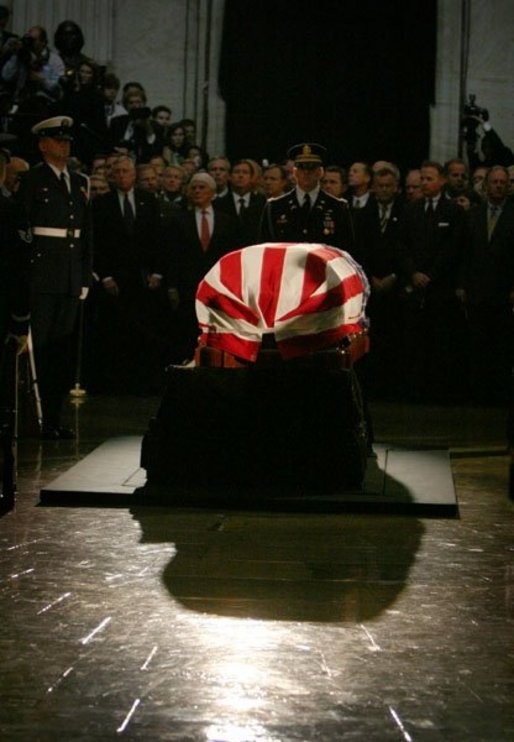
WASHINGTON (BP)–In 1983, President Ronald Reagan wrote an essay on abortion that pro-life advocates quote to this day.
He defended the life of the unborn in the essay, predicted that the nation’s opinion on abortion eventually would change and expressed his desire to see Roe v. Wade overturned.
“He probably did more than any other one politician to put the pro-life agenda on the radar screen of the nation,” Richard Land, head of the Southern Baptist Ethics & Religious Liberty Commission, told Baptist Press.
Reagan’s essay, “Abortion and the Conscience of the Nation,” was first published in The Human Life Review journal and eventually published in a book. The book, also called “Abortion and the Conscience of the Nation,” was published again in 2001.
“We cannot diminish the value of one category of human life — the unborn — without diminishing the value of all human life,” Reagan, who died June 5, wrote.
The book served as an encouragement to pro-family groups, who saw their nation’s president go against the advice of some by publicly tackling a controversial issue.
“Despite the formidable obstacles before us, we must not lose heart,” Reagan wrote. “This is not the first time our country has been divided by a Supreme Court decision that denied the value of certain human lives. The Dred Scott decision of 1857 was not overturned in a day, or a year, or even a decade.”
Over time in the 1800s, Reagan asserted, Americans began to see the evil of slavery. Similarly, minds will change when people learn about the evil of abortion, he said.
“[T]he great majority of the American people have not yet made their voices heard, and we cannot expect them to — any more than the public voice arose against slavery — until the issue is clearly framed and presented,” Reagan wrote.
As governor of California, Reagan disappointed pro-lifers by signing a bill easing restrictions to abortion. It was an action, though, he later regretted.
Land said that as president, Reagan was “a voice crying in the wilderness in Washington, D.C., for the pro-life cause.”
“I think that Ronald Reagan’s election was the culmination of the evangelical Christian movement from non-involvement to involvement,” Land said. “[But] they were active before that. They were registering lots and lots of voters in 1976. And many of them supported Ronald Reagan when he ran for president against Gerald Ford in 1976.”
Reagan further won the praise of evangelicals when he spoke at a gathering called the National Affairs Briefing in 1980, Land said.
“This was a huge gathering in Reunion Arena of pro-life and pro-family activists and he said, ‘I understand that you can’t endorse me, but I’m here to endorse you’ — to thunderous applause,” Land said.
Sadly, Land said, two of Reagan’s nominations to the Supreme Court have not shared his views on abortion. Sandra Day O’Connor and Anthony Kennedy both have signed on to opinions upholding the Roe v. Wade decision, although Kennedy did side with pro-lifers in the 2000 partial-birth abortion case. A third justice, Antonin Scalia, has sided with pro-family groups on most issues.
“I think the president would be extremely disappointed in some of his nominees to the Supreme Court, just as George [H.W.] Bush is, I’m sure, disappointed with Justice [David] Souter,” Land said. “One of the problems with court nominations is you have to be very, very certain about who it is you pick or else they can change on you.
“There is no question that Justice Scalia is what he would like for his judicial legacy to be. Unfortunately, it also involves Sandra Day O’Connor and Kennedy.”
Reagan’s nomination of Kennedy came only after his first choice, Robert Bork, failed to win Senate confirmation in 1987. Bork’s judicial philosophy is more in line with Scalia’s.
Land said that in hindsight Bork might have won confirmation in 1986, when a seat opened and when Republicans held the Senate. Instead, Reagan chose to nominate Scalia for that opening, and he was confirmed with ease only months before Democrats won back the Senate. The next year, they led the charge to defeat Bork.
“But President Reagan wanted to put the first woman on the court [O’Connor] and he wanted to put the first Italian-American on the court [Scalia],” Land said.
Reagan’s biggest legacy, Land said, is the downfall of the Soviet Union and the ending of the Cold War.
“What greater legacy could you leave — for Americans in general and families in particular — in that I don’t have to worry about my children being incinerated in a nuclear holocaust,” Land said. “Why? Because of Ronald Reagan.”
The Cold War had a great impact on families, Land said, because it affected their safety and security.
“His strategy was to win the Cold War — not contain the Soviets … but to defeat the Soviets, and he did it without firing a single shot,” Land said. “The Soviet empire did not collapse. It was pushed, and Ronald Reagan was the one doing the pushing.”
–30–
(BP) photo posted in the BP Photo Library at https://www.bpnews.net. Photo title: PROPONENT OF LIFE.














